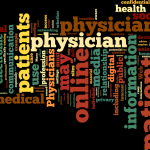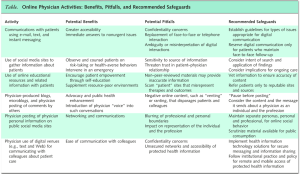 Lack of social media guidance for physicians
Lack of social media guidance for physicians
Professionals in healthcare have been slow to embrace social media and one of the reasons is the lack of social media guidance for physicians. Physicians face a number of issues related to compliance (HIPAA and in some cases FDA), maintaining trust in the patient/physician relationship and the integrity of the profession
Professional associations steps in
In some cases, professional associations, concerned with the potential negative impact of social media on the profession at large, have tried to fill the gap and issued guidance.
One of these associations, the American College of Physicians offers physicians a set of social media guidance to explain the pros and cons of social media as well as issue recommendations and safeguards for the proper use of social media
The goal of the recommendations being to preserve the trust in the patient/physician relationship and the integrity of the profession.
Recommendations and guidelines
Some of the main recommendations from the American College of Physicians include:
- Physicians should keep their professional and personal persona separate.
- Physicians should not “friend” or contact patients through personal social media.
- Physicians should not use text messaging for medical interactions even with an established patient except with extreme caution and consent by the patient.
- E-mail or other electronic communications should only be used by physicians within an established patient-physician relationship and with patient consent.
- Situations in which a physician is approached through electronic means for clinical advice in the absence of a patient-physician relationship should be handled with judgment and usually should be addressed with encouragement that the individual schedule an office visit or, in the case of an urgent matter, go to the nearest emergency department.
- Establishing a professional profile so that it “appears” first during a search, instead of a physician ranking site, can provide some measure of control that the information read by patients prior to the initial encounter or thereafter is accurate.
- Many trainees may inadvertently harm their future careers by not responsibly posting material or actively policing their online content. Educational programs stressing a pro-active approach to digital image (online reputation) are good forums to introduce these potential repercussions.
The ACP also develop the following chart detailing the different online activities, their benefits, potential pitfalls and recommended safeguards

